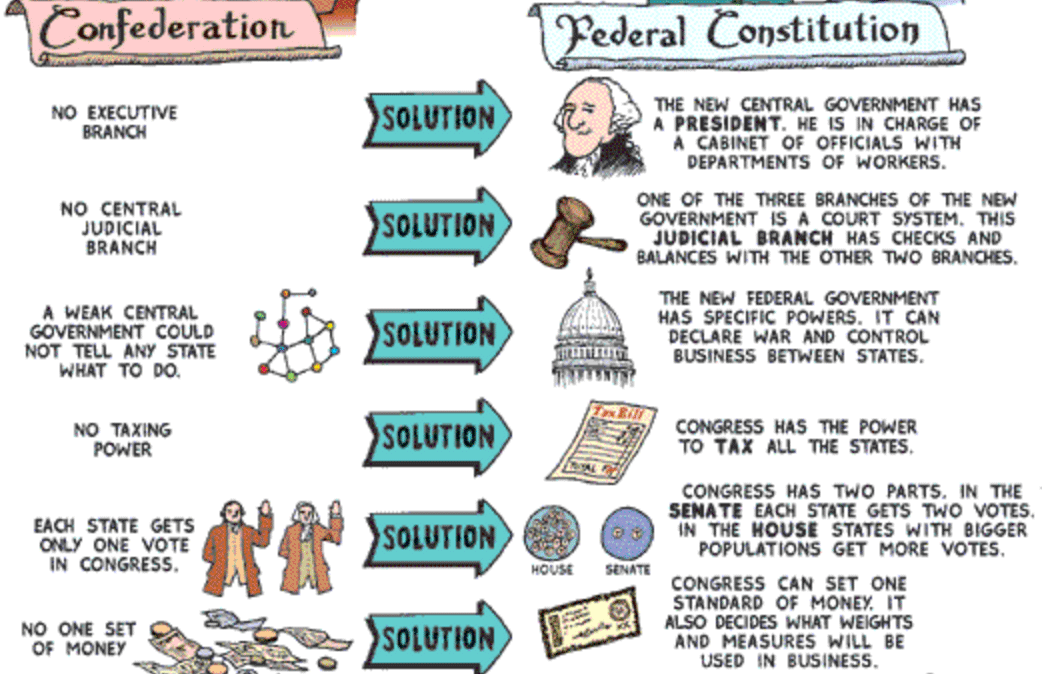Local, State, and Federal Governments Expensive—and Redundant
 It’s a rare conservative who can imagine an America without a President or Congress or Supreme Court or IRS or Constitution—in short, without a monolithic federal government. Only a few on the far right remember the United States of America during its first 11 years, right after the fledgling country militarily defeated the superpower British Empire in its own heyday.
It’s a rare conservative who can imagine an America without a President or Congress or Supreme Court or IRS or Constitution—in short, without a monolithic federal government. Only a few on the far right remember the United States of America during its first 11 years, right after the fledgling country militarily defeated the superpower British Empire in its own heyday.
The Articles of Confederation democratically anchored power almost directly in the people, through state governments. Governors ruled a House and Senate. Equality among states was taken for granted. No state had flyover status: weak, without voice, forced to kowtow to political potentates in distant urban areas. Citizens felt dignity in their own neighborhoods and regions.
As we know, however, the good often die young. Our Revolutionary War period was prematurely ended by radical federalists, who created an enormous central seat of power that mirrored almost exactly the structures of state governments. Redundancy.
Now we have 50 governors who manage the will of one president. The same goes for state houses and senates, courts, constitutions, tax collection, you name it. But redundancy can be very expensive, so what do we do with all the duplicated, powerless state versions of federal institutions?
The answer was simple: make them into middle managers. The President chooses Supreme Court justices—and both branches exert their power through executive decisions, easily overturning centuries of heritage and tradition to marginalize things like marriage, family, and religion in daily lives.
Now close your eyes just for a minute to imagine yourself back in feudal times, with a king who employed the aristocracy to manage local fiefdoms, implementing the will of the sovereign. And kings always went overboard asking for ever-increasing taxes, which takes us back to Colonial America’s beef with London—and today’s number one tool of federal power today, the IRS, located in distant DC.
We ask: can a new president really reverse federal control once the executive branch has assumed almost total power, even rendering control of congress into political impotency? One national news source says “Ted Cruz wants to eliminate the Department of Commerce, the  Department of Energy, the Department of Education, and HUD”and “Cruz also thinks he can eliminate the IRS.”
Department of Energy, the Department of Education, and HUD”and “Cruz also thinks he can eliminate the IRS.”
Another source argues that “Cruz is a states’ rights guy — he wrote his college thesis on the 10th Amendment — and wants to give control of schools to states or localities. He also would return block-grant funding to the states.” Great if Cruz, or Donald Trump, or any other candidate could actually return America to its pre-Constitution roots.
But we should also ask if federal power might be actually seated outside visible federal government, making office holders and bureaucrats little more than middle managers themselves. Politicians come and go, but the establishment and other power brokers live on. After all, the tools of power, like big media and the educational system, also live on.
 It’s a rare conservative who can imagine an America without a President or Congress or Supreme Court or IRS or Constitution—in short, without a monolithic federal government. Only a few on the far right remember the United States of America during its first 11 years, right after the fledgling country militarily defeated the superpower British Empire in its own heyday.
It’s a rare conservative who can imagine an America without a President or Congress or Supreme Court or IRS or Constitution—in short, without a monolithic federal government. Only a few on the far right remember the United States of America during its first 11 years, right after the fledgling country militarily defeated the superpower British Empire in its own heyday. Department of Energy, the Department of Education, and HUD”and “Cruz also thinks he can eliminate the IRS.”
Department of Energy, the Department of Education, and HUD”and “Cruz also thinks he can eliminate the IRS.”